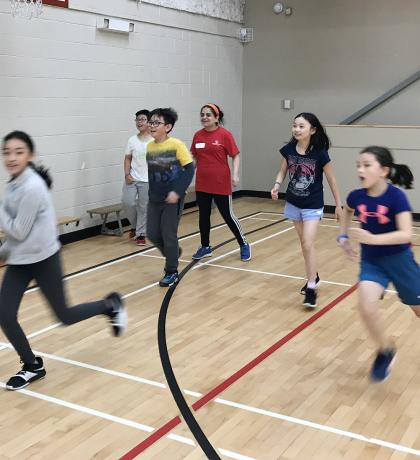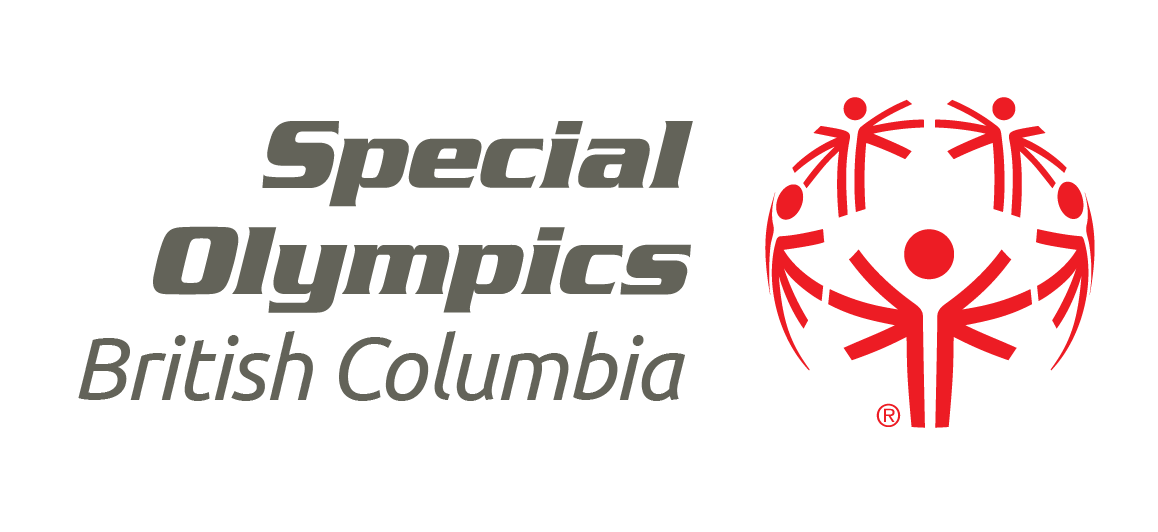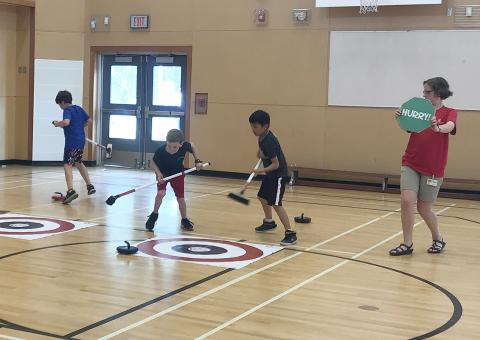
Game-changing youth project connected SOBC athletes and elementary school students
One of the reasons why individuals with intellectual disabilities continue to face exclusion and intolerance is lack of familiarity. In 2015, the Shriver Report Snapshot study about attitudes showed that the more than half of Americans who have personal contact with someone with intellectual disabilities are increasingly accepting and positive. It also showed that “lack of contact has left a legacy of misinformation, dated stereotypes, ignorance, and fear in the other nearly half of Americans.”
“When it comes to attitudes towards people with intellectual disabilities, experience is the game-changing ingredient,” the report concluded.
This is why it’s so important for people to see Special Olympics athletes in the spotlight for their abilities, changing mindsets about all that they can do. And this is why it’s so important for the next generation to come of age with greater familiarity with people with intellectual disabilities. The awareness work by youth advocates is incredibly influential to make a better and more inclusive world.
Nikol Grishin is a UBC Bachelor of Kinesiology student with a Health Science Specialization and president of the UBC Kinesiology Undergraduate Society. Grishin is a strong believer in the power of sport to build empowering skills, friendships, and eye-opening connections. After learning about Special Olympics, she developed an inspiring vision of bringing together Special Olympics BC athletes with elementary-school students to teach them sports such as basketball, bocce, indoor curling, and soccer.
This year, Grishin won a UBC Chapman and Innovation Grant in order to run her impactful program in five Lower Mainland schools. Her initiative created opportunities to break down the barriers that exist around individuals with intellectual disabilities and their capabilities, and create leadership opportunities and increased confidence for the participating SOBC athletes.
Grishin worked with groups of SOBC athletes who taught their sports to students in Grades 2 to 5 in Richmond’s Garden City Elementary and Diefenbaker Elementary, Vancouver’s Lord Kitchener Elementary, Surrey’s Rosemary Heights Elementary, and Coquitlam’s Mountain View Elementary. It was incredibly inspiring to see the warm response from the participating students and teachers, and the thoughtful leadership by the Special Olympics athletes.
Huge thanks to Grishin, to the students and teachers who participated with such enthusiasm, and to the amazing SOBC athlete leaders involved:
- SOBC – Coquitlam: Lauren Hogan and Matthew MacLean
- SOBC – Richmond athletes: Vincent Li (who also helped organize the athletes’ participation), Sandra Malku, and Nathan
- SOBC – Surrey: Kristina Ettema, Zack and Jesse Thibeault, and Michaela Robinson
- SOBC – Vancouver: Richard Louis and Miranda Orth
Grishin was kind enough to share her thoughts on the project experiences and background, all while in her final days of studying for the medical school entrance examination. We’re so grateful to this incredible champion of respect and inclusion!
How did you come to choose this topic for your project? Why do you think it is important?
Chelsea [Rogers, SOBC Community Development Coordinator for the Lower Mainland] came into one of the classes that I was taking, which was a class that focused on leisure opportunities for individuals with disabilities. Shortly after this class I had a professional development workshop for work, where I had learnt about the opportunity to apply for a grant to pursue a project that would support underrepresented communities. When I had heard about this grant, the idea to reach out to Special Olympics was the first thing that had come to my mind.
After hearing Chelsea speak, I remember thinking about how I wish I had heard about SOBC earlier, because I thought that the work that was being done was phenomenal and it was something that I would have loved to be a part of earlier, especially because sports have been a big part of my life for a long time.
But, the biggest reason why I really wanted to do this was because of experience and situations that I’ve witnessed over the years of certain comments being made towards individuals with intellectual disabilities and certain false perceptions that I have heard people say. There have been a handful of instances throughout both elementary school and high school where I had witnessed firsthand how children were being excluded from everyday things because of who they were. I never understood why people thought it was okay to be mean or exclusive, and in high school standing up for these individuals resulted in a lot of arguments between friends and long-lasting tension because being popular was more important than treating everyone with respect.
I never understood and never will probably understand why people think it is okay to treat others as if they are not good enough to be your friend. To me, I always saw people as people – we are all different in our own ways, so to exclude someone because of something that makes them unique was absurd.
In terms of why I think it’s important, I think I mentioned majority of my thoughts above but I wanted to specifically target a younger cohort because I had noticed that the preconceived thoughts and notions that individuals have tend to stem from a young age. By the time majority of individuals reach high school, they already have a foundation of what they believe in, what their values are and so forth.
Also, I’ve noticed that younger children are more curious and willing to learn and understand new ideas or concepts. If something seems unfamiliar to them or they’ve never heard about something – they will ask, they won’t just let their curiosity wander.
Inclusivity is a commonly used term, but I had multiple students who wanted me to elaborate on its definition and provide examples, and I think that this “desire” to learn is not as prevalent in an older cohort of individuals. As a whole, I think inclusivity is a term that many of us know but one that many of us forget about despite its importance.
When I think about inclusion, I think of recognizing individuals for who they are, and I think about how these unique factors come together to foster a safe and comfortable environment where people can be themselves.
Overall, how would you describe the response of the students?
Overall, I think the students had a lot of fun! I sent out a post-program survey and the response from all of the teachers was that their students really enjoyed the sessions. Because we focused primarily on Grades 2 to 5, we did have a fairly younger cohort and so of course they all had a lot of energy and enjoyed trying sports that they perhaps wouldn’t usually play, such as indoor curling.
I also think that a lot of the students actually looked up to the athletes that came to the sessions. I overheard a lot of students talking to the athletes and asking them questions about their experiences within sports, the tournaments they’ve been to, and so forth.
One class actually came prepared with papers and pens and asked for the autographs of all the athletes and I thought that was just the most amazing thing to see. First, it showed that the students looked up to the athletes and saw them as role models; second, it showed the athletes that they are in fact these amazing leaders and athletes, and that they should be proud of all of their accomplishments.
Overall, how would you describe the Special Olympics athletes who participated?
The Special Olympics athletes who participated in this project were true leaders. They were amazing! They all did a phenomenal job facilitating the sport that they were in charge of, and you could tell that they all genuinely wanted the students to have fun and learn the sport. Also, hearing the athletes speak about what Special Olympics meant to them, you could tell that they were genuine with their responses and that they wanted to share their experiences with all of the students.
The athletes all had great interpersonal skills and made all the students smile and laugh but most importantly made the students feel welcome, included, and comfortable. They noticed when certain students were being “left out” and took initiative to make sure that that student would get the next ball, or the next turn to push the stone, or whatever sport that they were playing.
The athletes were also extremely welcoming of me and this project, despite the fact that I haven’t been involved with Special Olympics half as long as they have. I was greeted with such warmth and genuine enthusiasm, and I looked forward to every session primarily because of the interactions I knew I was going to have with the athletes.
Coming out of these sessions, I myself look up to these athletes for being as kind and welcoming as they were, and for always being good leaders and role models for all of the students.
In general, what did you observe during the interactions between the students and the athletes, either during the conversations or during sport?
Every class was different, so I had the opportunity to witness a lot of different interactions. One thing I noticed was that some students opened up to the athletes about their experience with sport, whether it was simply about the type of sport they played or if it was why they played the sport that they did.
During one class I overheard a student telling an athlete about his sister’s experience with Special Olympics. I thought it was a special interaction because you could see this student felt comfortable speaking about it, and I think he found someone that could possibly resonate with what he’s seen his sister go through with being excluded and other situations. This was a student that, in the beginning seemed to be very shy but by the end of the session was the most talkative student in the gym. Truthfully, that was by far the most memorable interaction of the entire project.
The athletes took on a leadership role with such ease, and although you could tell some were a little bit nervous at the beginning, they all did such a phenomenal job. They made the students laugh, and every time I would look at the different stations we were running I could see smiles gleaming across all of the student’s faces.
Also, the athletes were all very empathetic and were great leaders in the sense that they didn’t just tell the student what to do but they helped the students when they were frustrated, they mediated certain arguments or conflicts between students, and they helped students if they ever got hurt by sitting down and waiting until they were ready to get back into the game.
In my eyes, they embodied leadership to its fullest extent. I’ve always believed that the best leaders are ones that lead within a group – meaning that they include everyone in activities, that they take everyone’s thoughts and opinions into consideration, and that they empathize with others around them.
It may seem like this is a lot to get out of a 45-minute gym class with students, but it’s the small things that show you what type of a leader a person truly is, and I was impressed with how all of the athletes lead.
Could you share your thoughts on why inclusion matters?
I feel like this is such a simple question with such a complex answer. I think that in essence, inclusion is the key to creating a true sense of belonging within a certain community. Inclusion has so many different variations and examples, and can be applied to many situations. Thus, inclusion is something that we come across every single day, and that’s what makes it of even greater importance.
To me inclusion matters because it is a way to bring people together of varying backgrounds and abilities. It matters because inclusion sees a person as exactly that, a person. A person with some sort of uniqueness, as we all are individualistic. Inclusion does not discriminate, it does not stereotype and it doesn’t produce preconceived ideas about others.
The most important thing is that inclusion matters because it makes people feel welcomed for who they truly are, not for what others perceive them to be.
Join Grishin and the Unified Generation! #ChooseToInclude and be part of Special Olympics BC as an athlete, coach, or volunteer.

